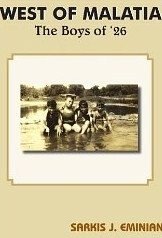Sarkis J. Eminian, the author of West of Malatia: The Boys of ’26 (AuthorHouse, 2004), passed away on May 6. He was the beloved husband of Joanne (nee Zirngibl) for 50 years; loving father of David (Debbie), Robert, and Karen; and dearest grandfather of Kelcie, Emily, Jacob, and Nicholas. Sarkis was a World War II Navy veteran, and longtime advertising executive and published author.

West of Malatia was his first book, and begins around the turn of the 20th century when Armenian refugees settled in Newburgh, Ohio. By 1920, many had married and Armenian families began to form. In 1926, five young men were born to the families in one of the “clans.” “The Boys of ’26” were the first-born sons of a clan of seven families.
Says friend Violet Dagdigian of Westford, Mass., “[West of Malatia] brought back many memories for Clevelanders and others who shared a similar lifestyle in other Armenian communities in the U.S. For a man of his age to tackle the challenging task of publishing a book was certainly praiseworthy. According to his friends, he was working on a novel based on Armenian history and also some short stories when he passed away.”
A Prayer Service was held at Nosek-Mccreery Funeral Home in Brecksville, Ohio on May 13, followed by Mass of Christian Burial at St. Basil Church in Brecksville. Contributions to the St. Basil Church Liturgical Tribute Fund would be appreciated.
Sarkis was also a contributor to the Armenian Weekly. A moving Letter to the Editor he sent to the Weekly was published in February. Another article he sent just before his passing is published below, for the first time.
***
We Are Brothers and We Are One: ‘The Boys of ’26’
By Sarkis J. Eminian
These days the Hairenik and many other papers are filled with something called the protocols. To refer to the protocols as controversial is to minimize the impact it has had on all Armenians. As to its advantages and disadvantages, I leave that to those qualified writers who are far more knowledgeable with diplomacy, geopolitics, and what have you.

What my friends and I believe will have no effect on the outcome of the protocols. None what-so-ever. My friends and I are first generation-born American Armenians, born in 1926. We are ordinary people. We are your average man on the street. The everyman. We are the people with a voice and opinion. It took years for us to really realize the meaning of what it meant to live in the diaspora. When we were young, that word did not hold the meaning it does today. But subjects like the protocols, the recent Armenian Genocide bills in Congress, even the threat to the abandonment of our beloved “Mer Hairenik” national anthem have brought special meaning to us.
Here is why. My three friends are soon going to be 84 years old. We were born in 1926. I was the first, born on March 9, 1926. We are the Boys of ’26, hence the subtitle of my memoir a few years ago inspired by the death of 100-year-old Garo Mesrobian, one of the fathers in our clan.
The “Boys,” Simon Bajaksouzian, Peter Dadaian, Richard Mesrobian, and I, meet approximately once a month at one of our favorite restaurants. There is a kindred spirit between us that transcends kinship, or just being friends. We are bonded by being born into our clan, and living a lifetime together that now spans more than four score years. Our discussions usually cover our families and recollections of our parents. Inevitably the talk turns to hot topics like the protocols and the genocide bill in Congress.
On this particular day we discuss both topics, and as usual we are almost in agreement on most points. But unlike most of our discussions, this one takes a most intriguing turn. As I said before, we are children of the diaspora. Actually we were only 11 years removed from the genocide itself. The memories, the visions, even the sounds were still fresh in the minds of our parents and friends who managed to survive that nightmare. When we were born, our parents were young adults, still learning a new language and shedding their refuge identity. Those were days in “Little Malatia,” where we went with our young mothers to shop, barter, and haggle with Polish storeowners for food, clothes, even school supplies. They were so young then. It is hard to imagine. Our clan was born and that is how we survived in those early years. They never once talked about the genocide or told us what had happened. They carried that hellish experience, and kept it locked in their minds.
Years later as little pieces came out, and we learned more about it, we wondered how they ever managed to survive. Imagine being there and afterwards hearing the Turks deny that the genocide ever happened. It had to be the most maddening experience! Which brings me to the point I am trying to make. Any approval of the protocols by Armenia would serve as a forgiveness of the Ottomans for their crime against humanity. This is something that would not be right. Because those who are in position to approve the protocols cannot forgive. Only the survivors of the genocide, only the victims carry the power of forgiveness. No one else caries that authority. In retrospect, is genocide forgivable? Is such a crime ever erasable, because diplomacy and politics and power dictate it? No. The carnage that exploded in 1915 is still among us, reverberating like an aftershock. The protocols simply added to the pain.
Like the bones in the great Syrian desert shown on “60 Minutes” recently, and like the bones that the churning desert sand has tossed and turned for 105 years, the act of genocide is infinite.


May you rest in Peace Mr. Eminian.. Thank you for your contribution to the Armenian people…
I just read Sarkis Eminian’s book, “West of Malatia…The Boys of ’26. I was going to write him a letter and just found out he had passed away in 2010. I think my brother, Tevon Eminian, and I are related to Sarkis and his family. My Dad, Michael Eminian, had 3 brothers, Arthur, Andon and George. My paternal grandfather’s name was Thomas Eminian and his wife was Philomene. They came to the U.S. in 1913 and settled in New York City. Grandpa Thomas had 2 sisters. I think one was named Katherina. They were Armenian Catholic, and on the back of the book was a photo of Sarkis Eminian and boyhood friends, and he looked very much like my father and his brothers. I’m not sure who I am corresponding with at this time, but please send me an email since I am very interested in founding out if we are related to Sarkis and family. My Dad, his brothers and my mother have all passed away. Please let me know, if possible.
Dear sir
I need the families list who were sent from Malatya , Gaziantep, Urfa to other cities in the past . I have to find my relatives ( my mother’s uncles, aunts, cousins ,nephews etc…) one of tghem as ” sandik emini” during Ottoman. and they had a big shoe store in Malatya . and also my grandama’s name was YESTER . ONE OF HER RELATIVES NAME IS RUBUN GAZARIAN. AND RUBUN’S LETTERS WAS SENT TO MY UNCLE FROM CLEVELAND IN THE PAST . NOW I WANT TO FIND THEM AND TO HELP MY MOTHER TO MEET THEM BEFORE HER DEATH. MY OTHER IS STILL LIVING . ALWAYS SHE TOLD ME ABOUT MY GRANDMA AND I WANT TO KNOW HER DAUGHTERS AND SONS TOO. PLEASE HELP US TO FIND GAZARIAN FAMILY WHOI MOVED FROM MALATYA , URFA AND GAZIANTEP. THANKS ..
adaletya@gmail.com
nick name : adaletya
I just read Sarkis Eminian’s book, “West of Malatia…the Boys of ’26.” I was going
to write him a letter and just found out he had passed away in 2010. I think my brother, Tevon Eminian, and I are related to Sarkis and his family. My Dad, Michael Eminian, had 3 brothers, Arthur, Andon and George. My paternal grandfather’s name was Thomas Eminian and his wife was Philomene. They came to the U.S. in 1913 and settled in New York City. Grandpa Thomas had 2 sisters. I think one was named Katherina. They were Armenian Catholic, and on the back of the book was a photo of Sarkis Eminian and boyhood friends, and he looked very much like my father and his brothers. I’m not sure who I am corresponding with at this time, but please send me an email since I am very interested in founding out if we are related to Sarkis and family. We might have cousins we do not know about. My Dad, his brothers and my mothers have all passed away, and I am very interested in founding out my Dad’s family.
I had the pleasure of working with Sarky many years in the advertising business at two different advertising/sales promotion companies. (Griswold-Eshleman in the 70’s & H&M/Arocom in the 80’s) Sarky had a brilliant mind. He was known as a man full of creative ideas and solutions to problems. I am fortunate to have traveled partially down the road of life with him.